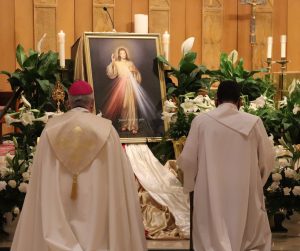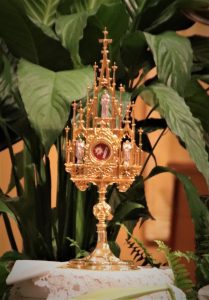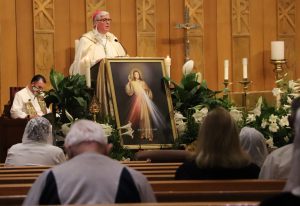The Second Sunday of Easter, or Divine Mercy Sunday, completes the Octave of Easter, a celebration of the resurrection of Jesus Christ and the blessing of His continuing presence in our midst. The Gospel reading for Divine Mercy Sunday (April 11, 2021) recalls the encounter between St. Thomas and Jesus after the Resurrection.
 For many in the Diocese of Venice, the Feast of Divine Mercy takes on a powerful meaning when they participate in a private or public prayer called the Chaplet of Divine Mercy and is a time to remind the faithful that the Lord’s Mercy has no end.
For many in the Diocese of Venice, the Feast of Divine Mercy takes on a powerful meaning when they participate in a private or public prayer called the Chaplet of Divine Mercy and is a time to remind the faithful that the Lord’s Mercy has no end.
This year, the marking of Divine Mercy Sunday at Epiphany Cathedral in Venice incorporated a prayer service for healing and forgiveness for anyone who has been touched by a pregnancy loss.
“Sometimes in a loss – whether it is through a miscarriage, stillbirth or abortion – so much is going on; the hurt is so strong one might believe they can’t approach the Lord,” Bishop Frank J. Dewane said. “Divine Mercy Sunday is here to remind us to call upon the Lord for the forgiveness, compassion, and mercy regardless of how we got there.”
“While one might be afraid to approach the Lord in the context of shame or fear, Divine Mercy Sunday is about the all-encompassing power of God to forgive,” the Bishop added. “Just as the Apostles were locked in the upper room with fear when Jesus Christ appeared to them, we lock ourselves in – so alone – thinking the Lord can’t forgive us. No matter what it is we lock inside, this must not prevent us from seeking forgiveness.”

Father Shawn Monahan, OMV, Epiphany Cathedral Parochial Vicar, who counsels women who have suffered the loss of a child through abortion, stillbirth and miscarriage, also reflected on the power of Divine Mercy Sunday.
“The mercy is never with condemnation and always with compassion,” Father Monahan said. “Healing takes time, so we must be patient with ourselves in the process, in walking with the Lord, and tuning our ears to hear His voice and to trust in His love and mercy.”
Divine Mercy Sunday is a tradition in Parishes throughout the Diocese and the world, celebrating the mercy of Jesus as recalled to us by St. Maria Faustina Kowalska, a religious sister who lived a humble life to whom Jesus appeared. St. Faustina was born in Krakow, Poland and lived from 1905-1938 being canonized by St. Pope John Paul II in 2000 and at that time declared the Second Sunday of Easter as Divine Mercy Sunday.
The image of the Divine Mercy was created by St. Faustina who was told to paint the image of Jesus as she saw Him. The painting has the saying at the bottom: “Jesus, I trust in You.” The rays emanating from Jesus represent water – which makes souls righteous — and blood — which is the life of souls, Jesus told St. Faustina.
 Among the practices associated with the devotion are its novena, the Chaplet of the Divine Mercy (a series of prayers organized similarly to a rosary), the Hour of Great Mercy (a time of prayer traditionally celebrated at 3 p.m.), and a plenary indulgence granted to those who receive the Eucharist and the Sacrament of Reconciliation on Divine Mercy Sunday.
Among the practices associated with the devotion are its novena, the Chaplet of the Divine Mercy (a series of prayers organized similarly to a rosary), the Hour of Great Mercy (a time of prayer traditionally celebrated at 3 p.m.), and a plenary indulgence granted to those who receive the Eucharist and the Sacrament of Reconciliation on Divine Mercy Sunday.
The Epiphany Cathedral service included the singing of the Divine Mercy Chaplet, the opportunity for the Sacrament of Reconciliation as well as a display of the Divine Mercy image and a relic of St. Faustina.
Epiphany Cathedral has a long history of celebrating St. Faustina as a devotion to her dates to the founding of the Diocese of Venice in 1984 when a weekly Mass in Polish began there. Earlier on Divine Mercy Sunday, a Mass in English, Polish and Spanish was celebrated and afterwards was also the opportunity for prayer before the relic of St. Faustina.
A video of the full service can be found at https://vimeo.com/536429647





